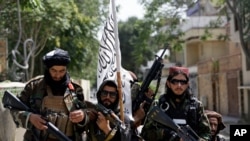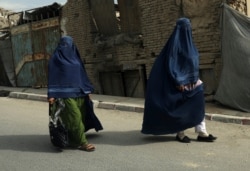U.N. and private aid agencies say human rights violations have been surging in Afghanistan since Taliban militants seized control of the country.
Aid agencies say Afghanistan is at a very dangerous point. They say an increasingly brutal conflict is worsening the already serious human rights violations in the country.
CEO of the Asia Pacific Refugee Network Najeeba Wazedafost says many people feared the resurgence of the Taliban, as the U.S. and NATO withdrew troops from Afghanistan. But she says few people thought the Taliban would gain control over the country so quickly.
She says it is horrifying to see the rapid escalation of human suffering and displacement under Taliban rule.
“It has been quite heartbreaking, especially in the past week, receiving a vast amount of calls to our ASPRN crisis helpline, where people have been reporting executions and beatings, and clampdown on media and radio stations. They have been reporting to us about Taliban door-to-door searches, targeted killings and looting in the capital. And again, we have been hearing about schools, and hospitals, and thousands of homes being attacked,” she said.
Wazedafost says she is most concerned about the voices of fear she is hearing from women. She says they talk about their fear of being killed simply because they are female. She says she also fears border closures triggered by the COVID-19 pandemic will prevent women and girls fleeing violence and persecution from finding safety.
Wazedafost is appealing to western countries that are leaving Afghanistan to not abandon the women and girls left behind and leave them without hope and the support they need to survive their changed circumstances.
The United Nations says decades of conflict, compounded by a second drought in four years and the devastating socioeconomic impact of COVID-19, have wiped out Afghanistan’s ability to survive without international support.
The U.N. Office for the Coordination of Humanitarian Affairs says nearly half of Afghanistan’s population, about 18 million people, need humanitarian assistance. The head of OCHA’s coordination division, Wafaa Saeed Abdelatef, says at least a third of the population does not have enough to eat and is suffering from acute hunger.
“We also estimate that half the children under five are acutely malnourished. And when a child is malnourished, this means also no access to enough food, to health, to water, to hygiene, to sanitation. And, also, malnutrition has a severe and irreversible impact on children. So, this is something that we cannot let continue,” she said.
This year’s United Nations humanitarian appeal for $1.3 billion has received just $500 million, leaving a funding gap of $800 million.





